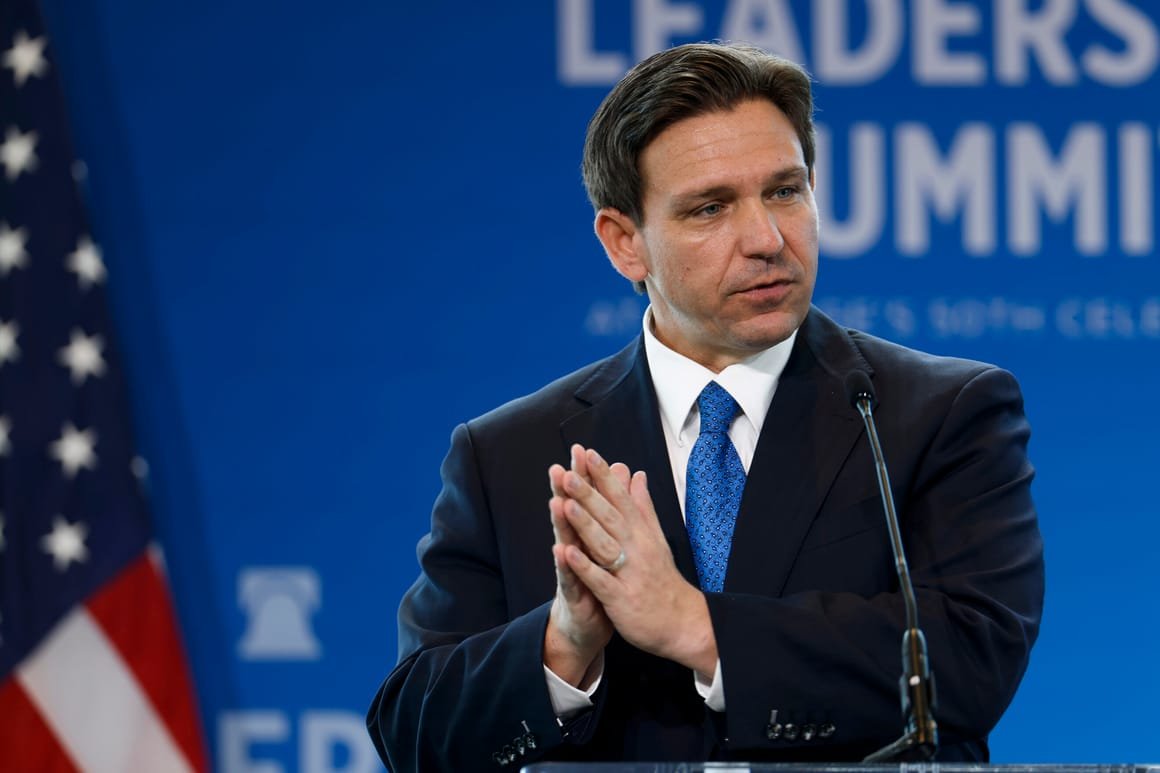Introduction: The Rise of Ron DeSantis Ron DeSantis’s political journey began with a strong foundation in academia and military service. After graduating with honors from Yale University and earning a law degree from Harvard Law School, DeSantis served as a Judge Advocate General (JAG) officer in the U.S. Navy. His military tenure included a deployment
Introduction: The Rise of Ron DeSantis
Ron DeSantis’s political journey began with a strong foundation in academia and military service. After graduating with honors from Yale University and earning a law degree from Harvard Law School, DeSantis served as a Judge Advocate General (JAG) officer in the U.S. Navy. His military tenure included a deployment to Iraq, where he earned a Bronze Star Medal for meritorious service. This robust background laid the groundwork for his entry into politics.
DeSantis’s political career took flight when he was elected to the U.S. House of Representatives in 2012, representing Florida’s 6th congressional district. His tenure in Congress was marked by a staunch conservative stance, aligning closely with the Freedom Caucus. DeSantis was known for his rigorous fiscal conservatism, advocating for reduced government spending and lower taxes. His legislative initiatives often focused on national security, veterans’ affairs, and constitutional rights, which resonated with his constituents and conservative base.
In 2018, DeSantis transitioned from the national stage to state politics, launching a gubernatorial campaign in Florida. His bid was bolstered by a high-profile endorsement from then-President Donald Trump, which significantly amplified his visibility and appeal among Republican voters. DeSantis won the Republican primary and narrowly defeated Democratic candidate Andrew Gillum in a contentious and closely watched general election.
As Governor of Florida, DeSantis quickly made headlines with several key policy decisions and executive actions. He prioritized environmental issues, notably signing legislation to address the state’s ongoing water quality problems and Everglades restoration. Additionally, his administration focused on educational reforms, including expanding school choice programs and increasing funding for vocational education.
These early achievements garnered DeSantis considerable support, positioning him as a rising star within the Republican Party. However, as his tenure progressed, DeSantis’s policies and leadership style began to attract increased scrutiny and criticism. This blog post will delve deeper into the complexities and controversies that have marked his governorship, providing a critical examination of his impact on Florida and beyond.
Policy Failures and Controversies
Ron DeSantis’s tenure as Governor of Florida has been marked by several policy decisions and controversies that have garnered substantial criticism. One of the most contentious aspects of his administration has been his handling of the COVID-19 pandemic. DeSantis faced intense scrutiny for his early resistance to lockdown measures and mask mandates, which many public health experts argued exacerbated the spread of the virus. His administration’s decision to prioritize reopening the economy over stringent public health measures was seen by critics as a gamble that risked lives for economic gains.
Environmental policies under DeSantis have also been a focal point of criticism. Despite initial promises to tackle the state’s pressing environmental issues, such as water pollution and climate change, many argue that his actions have fallen short. Notably, his administration has been accused of undermining environmental regulations to favor business interests, leading to concerns about long-term ecological damage. Environmental groups have particularly criticized his approach to managing the state’s waterways, citing insufficient efforts to curb nutrient pollution that leads to harmful algal blooms.
In the realm of education, DeSantis’s reforms have sparked heated debates. His administration’s push to expand school choice through vouchers and charter schools has been lauded by some advocates as a move towards greater educational freedom. However, detractors argue that this approach diverts crucial funds from public schools, exacerbating inequalities in the education system. Critics also point to his controversial stance on curriculum content, including efforts to limit discussions on race and social justice, which they argue stifle critical thinking and undermine comprehensive education.
DeSantis’s responses to social justice issues have further polarized public opinion. His backing of legislation perceived as suppressing voter rights and his support for measures that restrict protests have drawn ire from civil rights organizations. These actions are seen as attempts to curtail civil liberties and undermine democratic processes, raising significant concerns about their long-term impact on social equity and justice.
Overall, these policy decisions and controversies paint a complex picture of Ron DeSantis’s governance, highlighting significant areas where his administration’s actions have faced substantial opposition and critique.
Leadership Style and Public Perception
Ron DeSantis’s leadership style has been a subject of considerable debate. His approach to governance, characterized by an assertive and often combative stance, has garnered mixed reactions from various quarters. On one hand, his supporters commend his decisiveness and willingness to take bold stances on contentious issues. On the other hand, critics argue that his leadership style is divisive and polarizing, often alienating key stakeholders and segments of the population.
One of the most notable aspects of DeSantis’s leadership is his communication strategy. He often employs direct and unfiltered language, which resonates with his base but can come across as abrasive to detractors. This approach has been particularly evident in his interactions with the media, where he has frequently clashed with reporters and dismissed critical coverage as biased or unfounded. While such tactics have solidified his standing among supporters who value his combative demeanor, they have also drawn criticism for fostering a hostile media environment.
DeSantis’s decision-making processes have similarly been a focal point of public scrutiny. His handling of the COVID-19 pandemic, for instance, has been both praised and condemned. Supporters lauded his resistance to prolonged lockdowns and his emphasis on keeping the economy open, citing Florida’s relatively robust economic performance during the crisis. Conversely, detractors pointed to rising case numbers and hospitalizations as evidence of a reckless and irresponsible approach. Public opinion polls reflect this dichotomy, with approval ratings that fluctuate significantly depending on the demographic and political affiliation of respondents.
In terms of public perception, DeSantis’s leadership has been marked by a series of controversial decisions that have further polarized opinion. His stance on issues such as voter rights, education policy, and immigration has elicited strong reactions from both supporters and opponents. Expert analysis suggests that while his firm positions endear him to a loyal base, they also risk alienating moderate voters and exacerbating political divisions.
Overall, Ron DeSantis’s leadership style and public perception are emblematic of the broader political landscape in the United States, characterized by deep-seated polarization and contentious public discourse. His approach, while effective in mobilizing a dedicated base, continues to spark debate over its long-term implications for governance and societal cohesion.
Long-term Implications and Future Prospects
Ron DeSantis’s tenure as Governor of Florida has been marked by a series of controversial policies and actions that could have significant long-term implications for the state. His approach to governance, characterized by a strong emphasis on conservative values and a focus on deregulation, has both supporters and detractors. Economically, DeSantis’s policies have aimed at reducing government intervention, promoting business growth, and cutting taxes. While these measures have been praised by proponents for boosting the state’s business environment, critics argue that they could exacerbate income inequality and undermine public services.
Socially, DeSantis’s stance on issues such as education, healthcare, and civil rights has sparked considerable debate. His administration’s push for school vouchers and charter schools, for instance, has been criticized for diverting funds from public education, potentially leading to a decline in the quality of public schooling. Similarly, his handling of the COVID-19 pandemic, particularly his opposition to mask mandates and vaccine passports, has been a point of contention, raising concerns about public health and safety.
Politically, DeSantis’s actions have further polarized the state’s electorate. His support for restrictive voting laws and aggressive redistricting efforts have been seen as attempts to consolidate power, potentially undermining democratic processes in Florida. These moves could have lasting effects on the political landscape, influencing future elections and governance structures.
DeSantis’s tenure as governor also has national implications, particularly regarding his potential aspirations for higher office. His rising profile within the Republican Party suggests that he may be positioning himself for a presidential run. However, his controversial policies and governance style could either bolster his appeal among the conservative base or alienate moderate and independent voters. The national political stage will likely scrutinize his performance in Florida, and his ability to navigate these challenges will be crucial for his future prospects.
 Internet Connectz
Internet Connectz 













Leave a Comment
Your email address will not be published. Required fields are marked with *